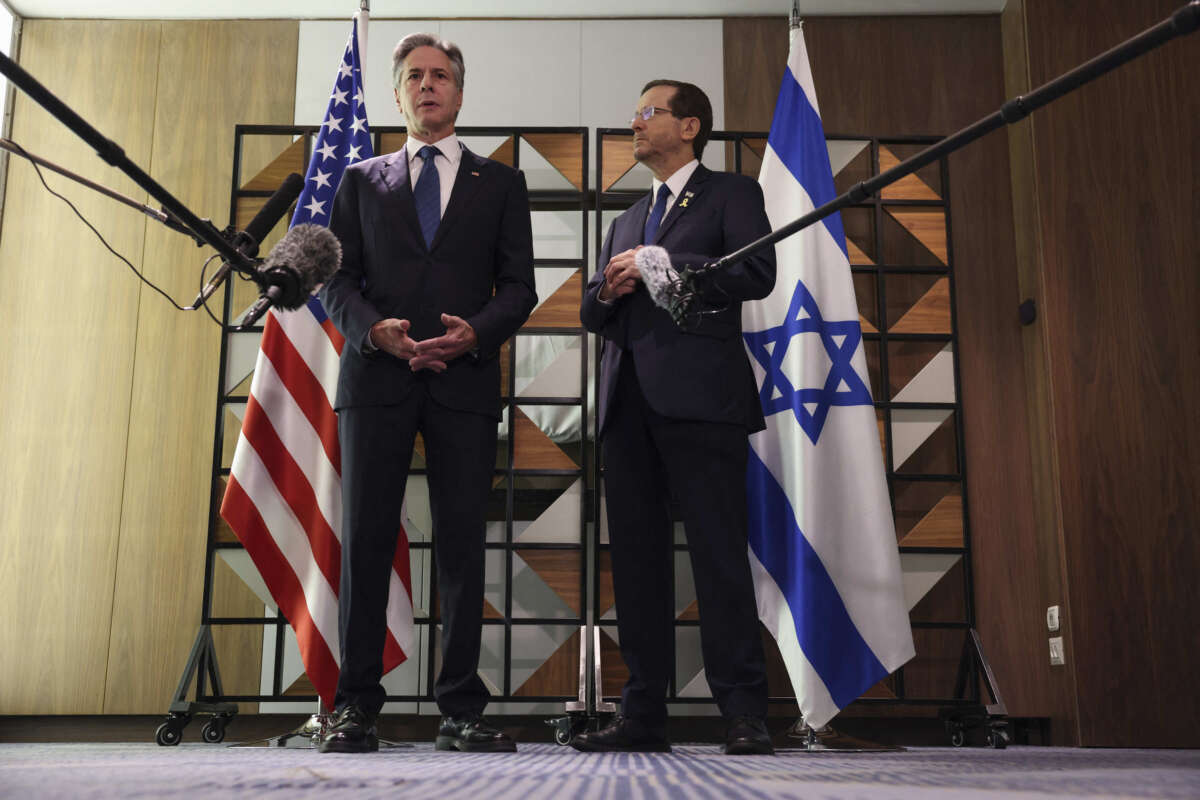U.S. Secretary of State Antony Blinken warned on Monday that it may be the last chance for negotiators to achieve a ceasefire deal as Israeli leaders continued to reject a ceasefire and demanded that any deal allow them to exercise military control in Gaza.
In remarks amid his visit to Tel Aviv, Blinken said that this round of negotiations is “the best, maybe the last, opportunity to get the hostages home, to get a ceasefire, and to put everyone on a better path to enduring peace and security.”
Blinken suggested that an escalation of tensions between Israel and Middle Eastern countries opposed to the genocide would jeopardize the deal — seemingly insinuating that, if all-out war were to break out, negotiators would have no choice but to allow Israel to continue the genocide. This is ironic as senior officials from Iran and other countries in the Middle East have said that a ceasefire is the only way to draw down tensions.
“It’s also time to make sure that no one takes any steps that could derail this process, and so we’re working to make sure that there is no escalation, that there are no provocations, that there are no actions that in any way could move us away from getting this deal over the line or, for that matter, escalating the conflict to other places and to greater intensity,” said Blinken. “It is time for everyone to get to yes and to not look for any excuses to say no.”
However, a deal is not looking likely due to Israel’s insistence that the agreement to secure a ceasefire does not actually include a ceasefire at all. Hamas officials have said that they are supportive of the three-phase ceasefire deal that the U.S. presented in May, but Israel has repeatedly rejected the deal.
The U.S., Qatar and Egypt presented a new ceasefire deal on Friday. The details of that deal are unclear, but Hamas negotiators have said that Israeli Prime Minister Benjamin Netanyahu is obstructing a deal because of his continued insistence that Palestinian negotiators give up all leverage and allow the genocide to continue.
According to Hamas negotiators, the latest deal “is in line” with Netanyahu’s demands, allowing Israel to keep its troops in Gaza and maintain control over the Rafah crossing, the Philadelphi Corridor that runs along Gaza’s border with Egypt, and the Netzarim Junction, which separates the northern and southern parts of the Gaza Strip.
Hamas also said that Netanyahu has placed new conditions on the prisoner exchange as Israel holds thousands of Palestinians in torture camps. The ceasefire deal would force Hamas to release all of the remaining living Israeli hostages — an unknown number between 50 and 120 — while Israel would release some of the Palestinians it has detained, but it’s unclear how many.
The likely failure of yet another round of ceasefire talks is a show of the U.S.’s refusal to use its leverage in order to get Israel to agree to a ceasefire. In fact, the U.S. has been seemingly encouraging Israel to continue its military incursions; last week alone, the Biden administration approved another $20 billion in weapons sales to Israel, after approving the sending $3.5 billion to Israel to buy weapons the week before.
That the U.S. continues to tout its ceasefire talks while seemingly making no progress toward a deal is a show that the process is merely a distraction, some commentators have said, that buys time for Israel to continue its genocide, which has killed at least 40,000 Palestinians so far, and likely far more.
“Initially, their primary purpose was to serve as a fig leaf for Israel to continue with its genocidal campaign in the Gaza Strip. In other words, their purpose is process, and their objective has therefore been to avoid reaching a ceasefire agreement rather than concluding one,” said Middle East commentator and analyst Mouin Rabbani on social media on Saturday.
“Just as Oslo served as the essential fig leaf enabling Israel to intensify settlement expansion and annexationist policies, while Washington ran interference for Israel with a ‘peace process’ designed to go nowhere, so with these ceasefire negotiations that commenced many months ago,” Rabbani continued.
Our most important fundraising appeal of the year
December is the most critical time of year for Truthout, because our nonprofit news is funded almost entirely by individual donations from readers like you. So before you navigate away, we ask that you take just a second to support Truthout with a tax-deductible donation.
This year is a little different. We are up against a far-reaching, wide-scale attack on press freedom coming from the Trump administration. 2025 was a year of frightening censorship, news industry corporate consolidation, and worsening financial conditions for progressive nonprofits across the board.
We can only resist Trump’s agenda by cultivating a strong base of support. The right-wing mediasphere is funded comfortably by billionaire owners and venture capitalist philanthropists. At Truthout, we have you.
We’ve set an ambitious target for our year-end campaign — a goal of $240,000 to keep up our fight against authoritarianism in 2026. Please take a meaningful action in this fight: make a one-time or monthly donation to Truthout before December 31. If you have the means, please dig deep.
